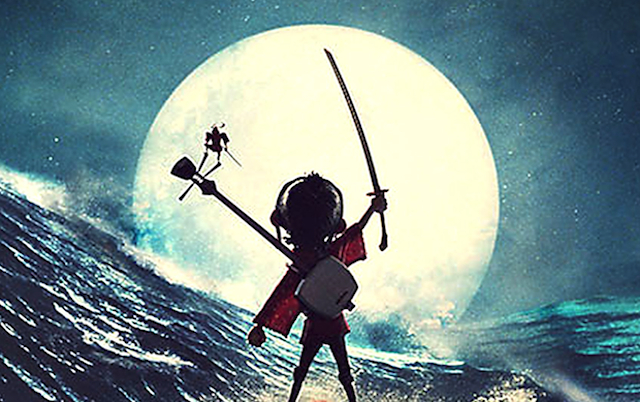CHICAGO – In anticipation of the scariest week of the year, HollywoodChicago.com launches its 2024 Movie Gifts series, which will suggest DVDs and collections for holiday giving.
Film Review: Fulfilling Emotion & Sumptuous Animation Awaits in ‘Kubo and the Two Strings’
CHICAGO – In our short lives, what do we most need? It’s a hard question to answer sometimes, but the new animated film “Kubo and the Two Strings” does a memorable job of answering the query. The journey of Kubo, like Dorothy in “The Wizard of Oz,” leads to a place where he needs to go.
 Rating: 4.5/5.0 |
I don’t want to compare “Kubo” to anything else, although it was done by the same animation house (Laika Entertainment) that gave us “Coraline,” “ParaNorman” and “The Boxtrolls,” and succeeds by having a simple story akin to “Finding Dory.” But where it excels beyond all those examples is in a cumulative glory – it uses the simplicity of origami, Kabuki theater, the Samurai tradition and Japanese prints to establish a atmosphere that is sometimes stunning in its grace. While the character Kubo does have a typical good versus evil conundrum, the use of the atmosphere is what gives the whole film a value beyond just black and white, and within the grayer subtlety lies its power.
Told as a folktale that might have been around for a 1000 years – although the story was newly formulated by Marc Haimes and Shannon Tindle – the scenario begins with a boy and his mother (voice of Charlize Theron) washing ashore after escaping a great battle. The boy Kubo has lost his eye, but lives. The pair make their home near the shore, and the mother is in a catatonic state most days.
To make ends meet, the now grown boy Kubo (Art Parkinson) goes to the village and tells legendary stories with a magic box guitar. As he weaves the tales, the characters come to life via origami, the paper folding art. His magic doesn’t go unnoticed, and a battle for his soul emerges, represented by the good (a protective Monkey and Beetle, who Kubo must accept) and evil (Two Sisters, his aunts). How the journey ends will determine his fate.
 Continue reading for Patrick McDonald’s full review of “Kubo and the Two Strings”
Continue reading for Patrick McDonald’s full review of “Kubo and the Two Strings”
The Japanese Samurai Tradition Lives in ‘Kubo and the Two Strings’
Photo credit: Focus Features
 Continue reading for Patrick McDonald’s full review of “Kubo and the Two Strings”
Continue reading for Patrick McDonald’s full review of “Kubo and the Two Strings”

